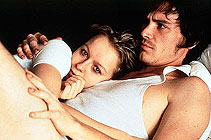|
|
|
|
Jesus'
Son
|
 |
|
We are so used to hearing voice-over narration in movies delivered in a particular way – even, detached, thoughtful, intimate – that we take this convention for granted. The most striking element of Jesus' Son, from its very first moments, is the militant oddness of its narrating voice. The reflections of FH (Billy Crudup) are stumbling or hurried, confused or declarative, veering wildly from high to low tones, full of holes and silences. It is a voice that recalls the childish hesitancy and poignancy of Linda Manz's narration in Terrence Malick's Days of Heaven (1978). It is a shame that so little else in Jesus' Son reaches this level of inventiveness – even though New Zealand-born director Alison Maclean (making her first feature since Crush, 1992) is constantly in search of moody, off-kilter, surreal effects. Set in the '70s, Jesus' Son is about the ragged, bohemian lives of drug addicts. As in so many chronicles of the junkie lifestyle in film and literature, scattered incidents involving waste, tragedy and high times – fragments of a scrambled or fried-brain memoir – are set against that narrating, authorial voice struggling towards some form of clarity and redemption. For FH – short for Fuck Head – existence under the influence is a matter of intense, isolated sensations and perceptions: "I knew every raindrop by its name", he testifies. Maclean accordingly works hard to make every moment a spectacle in itself. Strange games with camera focus; exaggerated, booming sound effects; scenes that are cut into pieces by freeze frames and chronological re-shuffling, as in Scorsese: all these tricks create a deliberate but often maddening mannerist style. Nothing, however, is quite as mannerist as the acting. The ensemble (with the pleasing exception of Dennis Hopper in a restrained and delightful cameo) reaches at every moment for eccentric gestures, postures and vocal intonations. Everybody that passes through FH's bleary vision is weird or menacing or both. Holly Hunter, in a small role, transforms a humble orgasm into a histrionic adventure. Crudup (a gifted performer) is like Vincent Gallo in overdrive, encouraged to fill every second with extravagant twitches, jerks and astonished movements of the eyes. Jesus' Son eschews a moralistic position on drug taking, echoing the matter-of-factness of the autobiographical J'entends plus la guitare (1991) whose director, Philippe Garrel, stated: "I took a purely medical viewpoint: hard drugs make you suffer". Maclean, likewise, takes a special, fascinated interest in bodily states and malfunctions – leading to a memorably gruesome hospital scene that momentarily brings her film closer to Trainspotting (1996) than Drugstore Cowboy (1989). American cinema, particularly of the independent variety, has been going through a phase of almost anthropological obsession with the relatively recent past – rendering milieux of the '60s, '70s and even '80s with a hyperreal attention to detail that makes lost forms of everydayness seem like life on Mars. Jesus' Son buys into this mania for making strange, but it lacks the bite and intrigue of, for example, Larry Clark's remarkable and underrated Another Day in Paradise (1998). For all of FH's primitive eloquence, it is hard to regard either his tragedy or his salvation as anything more than a freak show. MORE Maclean: Kitchen Sink MORE drug films: Rumble Fish © Adrian Martin August 2000 |
![]()